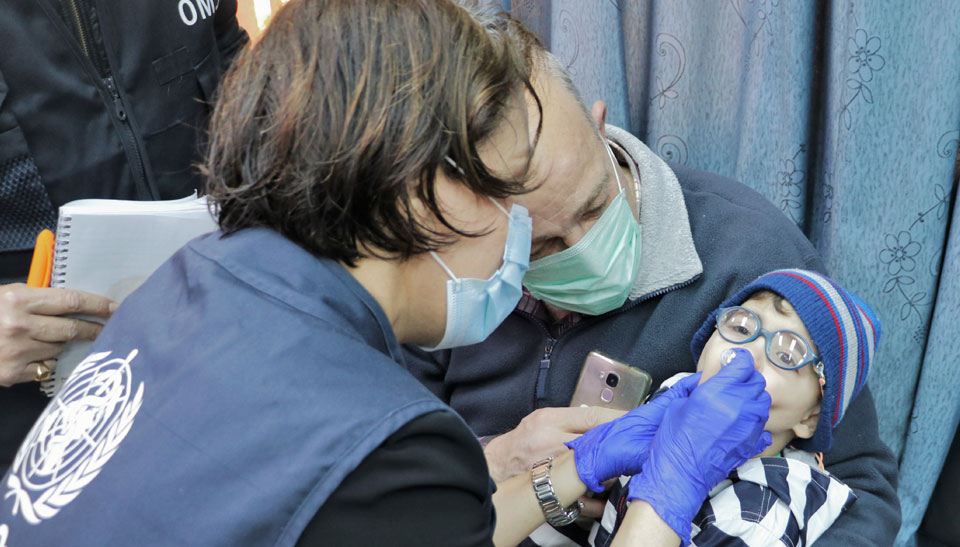
9 April 2021 - Amidst a decade-long conflict, economic crisis and political upheaval, WHO continues to support strengthening public health programmes and implementation of immunization activities, national polio vaccination campaigns and surveillance for acute flaccid paralysis.
In the middle of March 2021, a national polio immunization campaign concluded, reaching 2.5 million children under the age of five in all 14 governorates of Syria, including high-risk areas of the eastern Euphrates, refugee and IDP camps, and nomadic areas.
“Since Syria is close to countries that are at high risk of polio outbreaks, it is very important to maintain a high immunity barrier for children of age 0–59 months against polio,” said Dr Akjemal Magtymova, WHO Representative to the Syrian Arab Republic. “Last year, we didn’t have any outbreaks of polio or other vaccine-preventable diseases, so this campaign is crucial to sustain the momentum gained.”
Over 10 000 trained health workers and supervisors were mobilized during the campaign, working at the local and governorate level. WHO provided logistical support to ensure the smooth implementation of the campaign. This meant everything from facilitating refresher training for health workers and supervisors, to delivering the vaccines across Syria and transporting mobile vaccination teams and supervisors to just about every part of the country.
As has become standard with mass vaccination activities, COVID-19 preventive measures were strictly followed during the campaign, including physical distancing and the use of gloves, sanitizer, masks and other equipment. With the financial support of Gavi, the Vaccine Alliance, WHO provided personal protective equipment to all vaccinators working through Syria’s Expanded Programme on Immunization (EPI).
Syria has seen a drop in vaccination coverage for multiple antigens over recent years due to the sharp reduction in trained health workers and technical experts and the widespread destruction of infrastructure, including vaccination centres. Raising the immunity level to all vaccine-preventable diseases is a priority, but also a challenge.
Last year, Syria conducted two full national immunization campaigns and one subnational polio campaign.
“Insecurity in Syria is a serious impediment to reaching targeted children with polio vaccine. However, we have managed to reach and vaccinate children to prevent polio re-occurrence in Syria, especially at these times of COVID-19, where there is a risk of under-immunized children,” said Dr Magtymova.
|
Date of polio campaign (OPV) |
Targeted U5 children |
U5 vaccinated |
Reported coverage |
Post-campaign monitoring |
|
16–20 February 2020 |
2 804 279 |
2 652 471 |
95% |
89% |
|
19–23 July 2020 |
948 381 |
972 984 |
102.6% |
89% |
|
11–15 October 2020 |
2 804 279 |
2 553 658 |
91.1% |
92% |




